Many people associate care companies with support for the elderly – usually those aged over 65 and over. Yet there are a huge number of young adults that require support on a daily basis in order to lead an independent life.
At Helping Hands, the term ‘young adults’ refers to anyone from the age of 18 to 65, and we currently support 142 young people across the country. With conditions ranging from autism, cerebral palsy and muscular dystrophy, to complex neurological and spinal injuries, we’ve been assisting hundreds of young people for the past 30 years, enabling them to remain independent within their own homes.
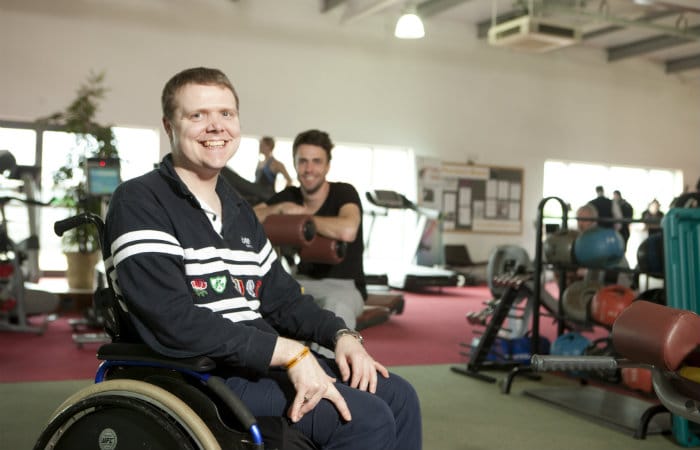
As part of our 30th birthday month, we’ve compiled a list of 30 ways we can help you or a loved one when it comes to planning care with a young adult in mind.
1. Uniform
Our visiting carers are all required to wear uniform, but for some young people this can draw attention to the fact they receive care, especially if they are out in public. With our person-centred approach, our carers can wear their own clothes when they accompany you out and about in the local community, making you feel more comfortable and less anxious.
2. Terminology
Many of our younger customers refer to their carers as ‘personal assistants’, ‘PAs’ or ‘support workers’ and use the word ‘assist’ or ‘support’ instead of care. We understand that semantics are really important, as many of our customers don’t feel they need to be “cared for” but “assisted to live independently”.
3. Independence
Being young is all about finding freedom, individuality and discovering who you are. Just because you require support with personal care or getting to the local shops, it doesn’t mean you can’t retain your independence. We specialise in both visiting and live-in care, so you don’t need to worry about moving to residential care; we will support you to be independent at home.
4. Respect
Being a personal assistant doesn’t mean that we will take over and do everything for you. We understand how important it is to respect your boundaries and enable you to live the life you want to lead – whether that’s attending your favourite music gig or assisting you to cook delicious meals.
5. The perfect match
The great thing about Helping Hands’ carers is the variety of individuals that we employ. This then allows us to match you with someone with a similar personality, interests and who understands your care requirements. So if you love catching up on the latest reality TV gossip or prefer to relax in the beautiful surroundings of a stately home, we’ll find the right person for you.
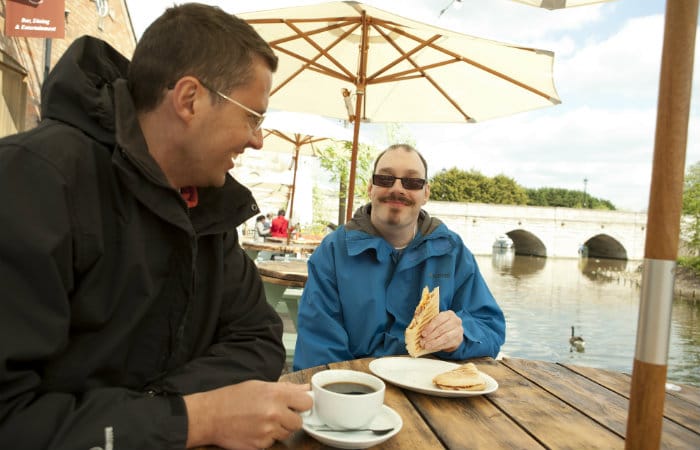
6. Mental health maintenance
It’s important for all of us to keep a check on our mental health, but when you’re dealing with a life-changing accident or condition that affects your day-to-day life – some days are harder than others. Sometimes all you need is someone to talk to and listen to how you’re feeling, which is why our carers will always be there for you.
7. You’re not defined by your condition
Whether you’re living with spinal muscular atrophy, myalgic encephalomyelitis (ME) or a learning difficulty, your condition doesn’t define you. We want to make sure that you live the life you want to lead, where you’re fully supported and able to flourish.
8. Flexibility
Care needs can change constantly, particularly if you are living with conditions such as Crohn’s disease, which can have the tendency to flare-up at different times. It’s really important that we’re able to build the right care package for young people, taking into account change in preferences or care needs. If you need us to increase the amount of calls we make on a weekly basis or change your arrangement to a live-in carer, we can easily cater to this – giving you peace of mind that you’ll always be cared for in the way you want to be.
9. Studying
For many, university is a right of passage and the first real experience of looking after yourself and finding your way in the world. To ensure you have the same experience as anyone else, a Helping Hands personal assistant can help with everything from personal care, preparing meals, getting to and from campus and even supporting you on a night out!
10. Work
After you’ve graduated, we can also help when you’re in full or part-time employment. Your PA can accompany you to your work place and assist you with tasks, meetings and travel arrangements. Jemma, one of our live-in customers, is a full-time maths teacher at a secondary school in North London. Her PA helps her to get to and from work, hand out equipment and function in her classroom. Find out more about her story here.
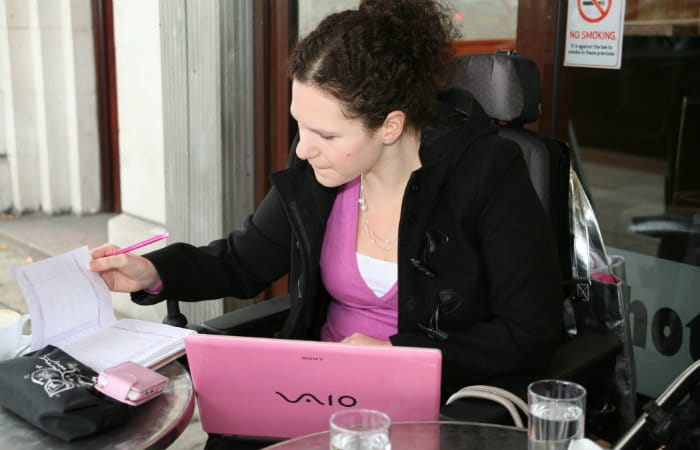
11. Be informed
If you’re looking to study at university or have sustained a life-changing injury and aren’t sure of the financial support available to you, our team of professional carers can ensure that you’re fully informed. Your PA can help you contact the Disabled Students Allowance (DSA), who are able to provide extra funding for adaptations, travel arrangements or equipment whilst you’re studying. Or if you want to find out more about health care funding, our support workers will help you to find the right options.
12. Holidays
Nothing beats the feeling of the sun on your face and the sound of the waves gently hitting the shore. Going on holiday is something we all deserve and look forward to, but if you require support to do this, our carers can accompany you on holiday wherever you decide to go. Whether it’s a few days away to the nearest seaside town or exploring foreign lands, your PA can be there to share the sights, sounds and excitement of a well-earned break.
13. One size doesn’t fit all
What may work for some may not work for others. Just because you know someone that lives with the same condition that you do, it doesn’t mean that the same package of care will work for both of you in the same way. That’s why we create bespoke packages of care that puts you at the centre, meaning you get the freedom of choice and are in full control how and when you receive support.
14. Respite care with your loved ones
To make sure you never miss out on a family getaway, a support worker can also come on holiday with you and your family. If your regular caregiver is a relative, it really gives you all the chance to have a real break without worrying about care arrangements and give your regular caregiver a bit of a rest too.
15. Respite care as a taster
And if you do decide to try respite care, it can be a great way to see if a more permanent care situation is suitable for you when considering different care options. Having a live-in carer not only means that you always have someone around to assist you whenever you need them, but you also have a companion.
16. Be adventurous
Living with an acquired brain injury hasn’t stopped Tom, one of our young adults who has a Helping Hands PA. He’s always led an active lifestyle, and this continued after his injury in a road traffic accident. From cookery lessons and studying at college to canoeing, sailing and abseiling – his injury hasn’t been a barrier for him and he would encourage other young people living with a disability or injury to be as active as they possibly can.
17. Home adaptations
Part of an assessment from Helping Hands includes a check of existing home adaptations and any possible changes needed to enable you to remain safe in your own home. We’ll work with you, occupational therapists and social workers to get everything that you need in place to enable you to live comfortably and securely.
18. Extra help for loved ones
Caring for your child or relative can be extremely rewarding, but there are times where you inevitably may find things difficult, particularly if your loved one’s health is beginning to deteriorate. There may also be times when your health isn’t at its best and you’re unable to be the care giver that you once were. A support worker may take some of the pressure off you and allow you to spend quality time with your loved one, safe in the knowledge that they are getting the support they need.
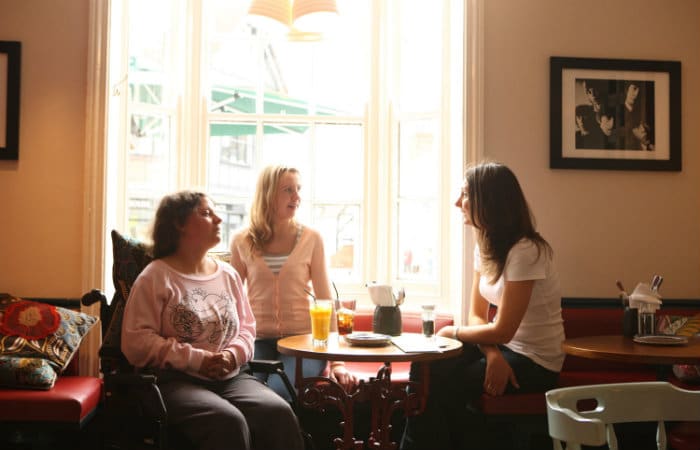
19. For relatives taking a step back
We all want our children to thrive and although it can sometimes be difficult letting them fly the nest, it’s a right of passage that all of us should have the right to do – regardless of any condition or injury that an individual may be living with. As a parent, if you’re thinking about taking a step back and finding suitable living arrangements once your child has reached adulthood, a live-in carer could be a great way to give them the independence they may be craving.
20. Expert carers
Our compassionate, empathetic and professional carers are put through their paces before they join the Helping Hands team. With thorough background checks and in-house recruitment, we only employ the highest calibre of people to join our family of carers. What we look for is a passion and kindness that can’t be taught; it’s just innately within.
21. Award-winning training
Delivered by outstanding practitioners, our industry-leading training programmes cover all aspects of care including manual handling, first aid, medication, safeguarding and personal care. As the first and only home care provider to be recognised as a Centre of Excellence by Skills for Care, we don’t just train our new carers to a very high standard, but we also provide regular refresher training for all of our carers to make sure they only deliver the very highest quality of care.
22. Clinical team
Our clinical nurses oversee all of our nursing care services, covering anything from stoma and gastronomy care, to complex spinal and neurological conditions. All of our clinicians have extensive experience within the nursing profession, with nearly all having previously worked for the NHS. Our team of experts means that we can provide care for complex conditions in your own home, enabling you to still go to work, study or continue with your favourite hobbies and interests.
23. Someone to talk to
If you’re living with a condition that affects the way you communicate or your ability to get out and about, a support worker isn’t just someone that helps with your care needs; they become a companion. Hannah, a young adult living with cerebral palsy in Kent, sees her PA once a week. She enables Hannah to get out to the local shops, go for a wonder in the park or to a café for tea and cake. They’ve built up a great rapport and see each other more like friends.
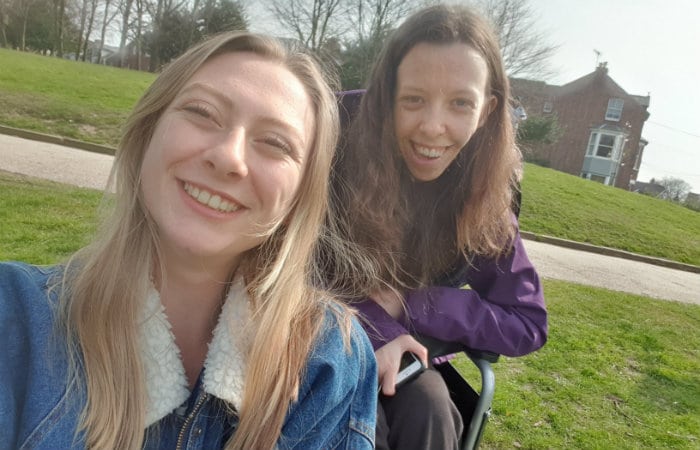
24. From our family to yours
Since 1989, our family-owned business has always been run with compassion at its heart. We know how important it is to care and as one of the UK’s leading home care providers, we really do put our customers’ interests first. So whether you need someone to pop in to tend to your personal care or you need help to get you to and from work on public transport, we’ll do what it takes to take any stress or pressure off you to ensure you’re happy and healthy.
25. Support for you whatever the weather
We often hear our customers say how Helping Hands seems to understand them as a young adult and what it means to be independent. With a carer chosen by you for you, they can help you to celebrate your achievements and milestones, but also be there through the bad times too. Lucy, a customer living with ME, describes how her support worker is “completely invested in improving [her] life”.
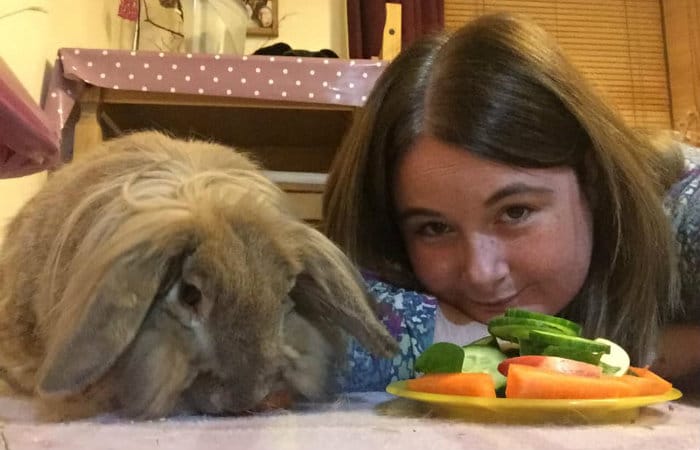
26. Support to do the unthinkable
With a severe injury or disability that limits your movements, the inevitable for some could be to lose the motivation to do the tasks and activities that you once did. Yet the help from a support worker or PA can mean that you’re able to do what you thought you might never be able to do again. When Ben, a customer from our Barnet branch, had a life-changing spinal cord injury, he was paralysed from the neck down. With the help of his PA Charmaine, he was able to attend physiotherapy appointments, prepare meals and tend to his personal care – he has even managed to take a few steps with the support of his walking aid and of course, Charmaine.
27. Distraction
Even if you don’t have any physical care needs, a support worker can be a great distraction if you struggle to deal with your emotions. Oscar, a farmer who lives in Basingstoke, used to have melt-downs throughout the day and get quite angry and aggressive. Since his carer has been popping in to see him while he’s at work, she has been able to distract him by talking about anything from the latest news to the wonderful British weather.
28. Accreditations
As one of the leading home care providers in the UK, Helping Hands isn’t short of its fair share of accreditations. We are members of the Spinal Injuries Association (SIA), who ensure we provide the most up-to-date care and advice for those living with spinal cord injuries. As well as being fully regulated by the Care Quality Commission (CQC), we are a founding member of the United Kingdom Home Care Association (UKHCA), who oversee the practices of all home care companies throughout the country. With industry-renowned care monitored to the highest standards, our care for young people is second-to-none.
29. Local to you
With nearly 100 branches across England and Wales, we have support workers local to you. From Newcastle, Cardiff, Ipswich and Brighton, our branch managers can meet you at your local branch, café, shopping centre or even come and visit you in your own home to discuss your care options.
30. ‘Living with’, not ‘suffering from’
If someone has a condition or injury, they can live well with their symptoms. Instead of using the term ‘suffering from’, we use the term ‘living with’ because not everyone with a condition will be ‘suffering’ from it, and we certainly aim to ensure that you never have to.
